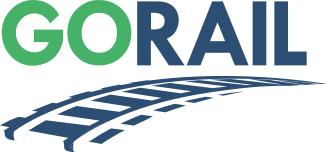Washington, D.C. — GoRail’s five state directors are in constant contact with local leaders across the nation to highlight the positive local impact of railroads—including the billions of dollars they invest each year to support safety, service, and the world’s best freight rail system.
Their goal is to educate local leaders about the public benefits of rail and recruit them as advocates on policy issues in Washington D.C. impacting railroads and the customers and communities they serve.
We wanted to provide some insight on the thousands of meetings and presentations GoRail state directors conduct each year. Here are some notes from the field:
Nate Kaplan: Last month I organized in Washington state, discussing a range of issues from crew size policies to rail grant opportunities to the AskRail app for first responders. As home to the chair of the Senate Commerce Committee and the ranking member on House Transportation, Washington is a key state for GoRail. Several meetings focused on local chambers of commerce, and four of these groups in Rep. Larsen’s district sent letters opposing crew size mandates to him and Senators Cantwell and Murray. Two chambers received responses requesting meetings to further discuss the impacts of the Railway Safety Act (RSA). These chambers had been unaware of the RSA’s crew size mandate and wouldn’t have taken a position if not for our meetings.
Emily Traiforos: I recently conducted meetings with local leaders in Congressman D’Esposito’s district (NY-4) and Congressman Kean’s district (NJ-7). My meetings included connecting with long-time rail advocates Assemblyman David McDonough in New York and Mayor Derek Armstead of Linden, NJ. Both have since sent letters to their elected officials. I also solidified newer relationships, meeting for example with three key NY assemblymembers who are currently reviewing draft letters to Rep. D’Esposito. In addition to meetings with local leaders, I was able to attend the New Jersey Rail Association meeting, where we received a federal policy update, a NJ legislative update, and heard from a company that helped with the I-95 temporary bridge rebuild. I also spoke to New York & Atlantic Railway about hosting Congressman D’Esposito for a tour at their Queens facility.
Brett Sebastian: I recently met with stakeholders across Kansas discussing issues like the Railway Safety Act, incident response and safety resources like AskRail, and the different freight rail-related infrastructure grants created by the 2021 Bipartisan Infrastructure Legislation. I met with statewide organizations in Topeka, chambers, and economic development corporations in places like McPherson and Dodge City and hosted a rail forum in conjunction with the Liberal Chamber of Commerce. Kansas is a crucial rail state with the fifth-largest track mileage in the country, acting as a critical crossroads for transcontinental traffic, agriculture, and industrial operations like refining and manufacturing. Efforts here this year resulted in contacts to state senators on adverse rail legislation at the state level, informational meetings on ongoing crew-size regulations before the state Department of Transportation, and letters and contacts to members of Congress on provisions of the RSA and opposing truck size and weight increases.
Christy Sammon: I conducted a site visit earlier this year in Rep. Mike Collins’ Congressional District in Georgia (GA-10). This included meetings with local economic development groups and chambers of commerce as well as local officials. For example, I learned in a productive meeting with the Athens/Clarke County Chamber of Commerce that they not only understand and appreciate the impact of freight rail on the economy, but they’ve also formed a regional task force in Northeast Georgia to discuss ways to coordinate transportation efforts. A meeting with the City of Athens was also very informative and we learned that the rail safety record in Athens is outstanding with no major accidents since the 1990s—contrary to the impression being promoted by supporters of the Railway Safety Act in the Senate.
Michael Gaynor: I recently met with community stakeholders in northern Ohio to discuss AskRail, federal rail grants, and need to maintain a balanced regulatory system in Washington. Ohio’s rail infrastructure, the third largest in the nation, supports manufacturing, agriculture, and trade throughout the state. While local elected officials appreciate the economic importance of rail, they also expressed concerns regarding safety. Everyone was impressed by the 2022 FRA rail safety data and the proactive steps railroads are taking to inform and educate first responders—especially the AskRail App. Not surprising, local leaders also considered rail crossing issues to be a safety issue and were very pleased to learn about the new federal grade separation funding. Several mayors agreed to and already have contacted Congress to request fully funding the grant programs.


